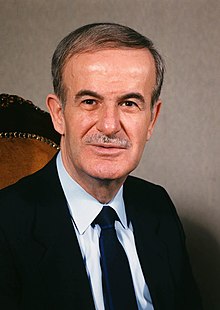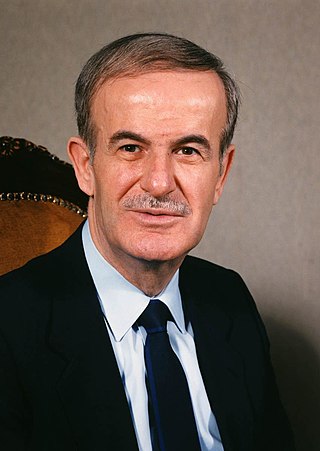
Hafez al-Assad was a Syrian statesman, military officer and revolutionary who served as the 18th president of Syria from 1971 until his death in 2000. He had previously served as prime minister of Syria from 1970 to 1971 as well as regional secretary of the regional command of the Syrian regional branch of the Arab Socialist Ba'ath Party and secretary general of the National Command of the Ba'ath Party from 1970 to 2000. Hafez al-Assad was a key participant in the 1963 Syrian coup d'état, which brought the Syrian regional branch of the Arab Socialist Ba'ath Party to power in the country.

Sheikh Khalifa bin Zayed bin Sultan Al Nahyan was the second president of the United Arab Emirates and the ruler of Abu Dhabi, serving from November 2004 until his death in May 2022.

Bassel al-Assad was a Syrian engineer, colonel, equestrian and politician who was the eldest son of Syrian President Hafez al-Assad and the older brother of (later) President Bashar al-Assad. It was widely expected that he would succeed his father as President of Syria until he died in a car accident in 1994.
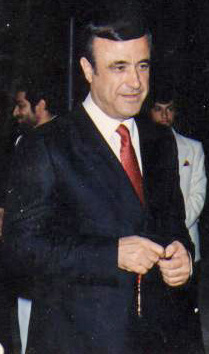
Rifaat Ali al-Assad is the younger brother of the late President of Syria, Hafez al-Assad, and Jamil al-Assad, and the uncle of the incumbent President Bashar al-Assad. He was the commanding officer of the ground operations of the 1982 Hama massacre ordered by Hafez al-Assad. Later declassified material backs his claims that his brother Hafez al-Assad was responsible, as do a number of commentators. Despite accusations, Rifaat has always denied culpability.
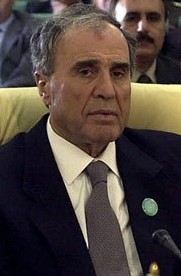
Ghazi Kanaan, also known as Abu Yo'roub, was Syria's interior minister from 2004 to 2005, and long-time head of Syria's security apparatus in Lebanon from 1982 to 2002.

Qardaha is a town in northwestern Syria, in the mountains overlooking the coastal town of Latakia. Nearby localities include Kilmakho to the west, Bustan al-Basha to the southwest, Harf al-Musaytirah to the southeast and Muzayraa to the north. According to the Syrian Central Bureau of Statistics, Qardaha had a population of 8,671 in 2004. It has a predominantly Alawite population and is the traditional home of the al-Assad family, which has ruled Syria since the 1970 Corrective Movement.

Assef Shawkat was the Deputy Minister of Defense of Syria from September 2011 until his death in July 2012.
Jamil al-Assad was a younger brother of the late Syrian president Hafez al-Assad, and the uncle of present Syrian leader Bashar al-Assad. He served in the Parliament of Syria, called the majlis ash-sha'b from 1971 until his death. He was also commander of a minor militia.
Asad, sometimes written as Assad, is an Arabic male given name literally meaning "lion". It is used in nicknames such as Asad Allāh, one of the by-names for Ali ibn Abi Talib.
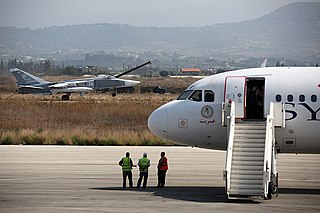
Bassel al-Assad International Airport is an airport serving Latakia, the principal port city of Syria. The airport is named for Bassel al-Assad (1962–1994), son of former Syrian President Hafez al-Assad and brother of his successor Bashar al-Assad.

The al-Assad family, also known as the Assad dynasty, is a Syrian political family that has ruled Syria since Hafiz al-Assad became president of Syria in 1971 under the Ba'ath Party. After his death, in June 2000, he was succeeded by his son Bashar al-Assad.
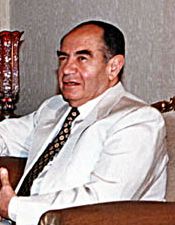
Hikmat al-Shihabi, also known as Hikmat Shihabi, was a Syrian career military officer, who served as the chief of staff of the Syrian Army between 1974 and 1998. As a Sunni, he was considered one of several non-Alawi members of the inner circle of former Syrian President Hafez al-Assad.

Sabah Al-Ahmad Al-Jaber Al-Sabah was the Emir of Kuwait from 24 January 2006 until his death in 2020.

AnisaMakhlouf was the matriarch of the Syrian Al-Assad family, which has ruled the country since 1971. The wife of the late Syrian President Hafez al-Assad, Makhlouf held the position of First Lady of Syria from 1971 until 2000. Her son Bashar al-Assad has been the President of Syria since 2000.
Ali Haydar, known as the "Father of the Syrian Special Forces", was a Syrian military officer who was the commander of the Syrian Special Forces for 26 years. He was a close confidant to President Hafez al-Assad and one of the members of Assad's inner circle. Born in the village of Hallet Ara, Haydar was a member of the Ba'ath Party from his youth. He was commissioned into the Syrian Army in 1952 after a stint studying at the Homs Military Academy. After the Ba'ath Party seized power in a 1963 coup d'état, Haydar was put in charge of Syria's special forces and supported al-Assad in his rise to the presidency. During this time he was deployed to Lebanon during their civil war. Haydar opposed the 1984 coup d'état attempt led by Rifaat al-Assad, instead remaining loyal to Hafez al-Assad. After suffering an aneurysm and leaving his post in 1988, he returned to lead the special forces again in the early 1990s. At the time a Major General, he was formally removed from his position and then imprisoned in August 1994, though he was treated well during his brief prison stay and was released without a trial or public humiliation. Haydar died in Latakia at the age of 90.

Saudi Arabia–Syria relations refer to bilateral and economic relations between Saudi Arabia and the Syrian Arab Republic. Diplomatic ties between these two countries of the Middle East have long been strained by the major events in the region. Saudi Arabia has an embassy in Damascus, and Syria has an embassy in Riyadh. Both countries are members of the Arab League and share close cultural ties.
Bassel is an Arabic given name. It should not be confused with the French surname Bassil.
The 2005 Arab League summit, officially 17th Ordinary Session of the Council of the League of Arab States at the Summit Level, was a regular summit that was held in Algiers, Algeria in March 2005.
